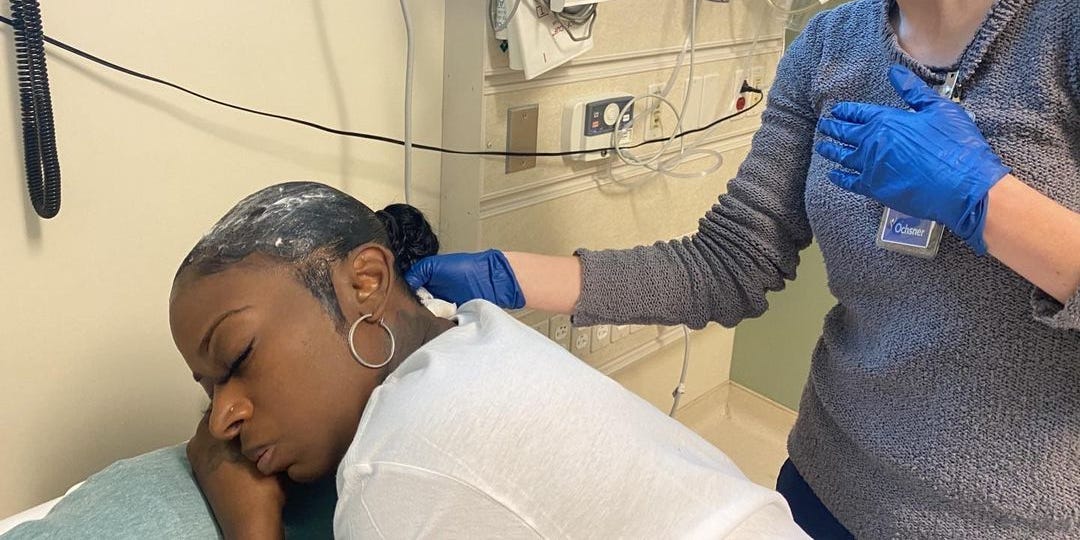
Tessica Brown/Instagram
- Tessica Brown went viral after posting a video asking for help getting Gorilla Glue out of her hair.
- TMZ reported that she was considering legal action against the company.
- Insider spoke with three personal injury attorneys and asked whether or not Brown had a case.
- Visit Insider’s homepage for more stories.
Earlier in February, people were gripped by the saga of Tessica Brown as she tried to get Gorilla Glue adhesive spray out of her hair after she used it instead of hairspray. Now, Brown is reportedly considering suing the company – but does she have a case?
Brown became a viral sensation virtually overnight after she posted a video of herself explaining that she ran out of her favorite Got2Be hairspray and substituted setting her style with Gorilla Glue adhesive spray instead. The original video of Brown, also known now as Gorilla Glue Girl, currently has over 3.4 million views on Instagram and was shared widely on social media.
She quickly grew a following of people who have been invested in figuring out how she planned to get the glue out of her hair, from using acetone on her scalp to visiting the emergency room.
Los Angeles-based plastic surgeon, Dr. Michael Obeng, offered to help Brown get the glue out of her hair for free, TMZ reported - a procedure that typically costs about $12,500, according to the publication. On Thursday morning, a video was released by TMZ of Brown completing the first day of what's expected to be a three-day procedure and finally freeing her follicles.
It was also reported by TMZ that Brown had sought out legal advice around possibly suing the company. Citing anonymous sources, TMZ wrote that Brown claimed the label was "misleading" because it "says do not use on eyes, skin or clothing ... with no mention of hair."
However, in an exclusive interview with Entertainment Tonight, Brown denied claims that she was considering litigation against Gorilla Glue.
Insider spoke with three personal injury attorneys on whether or not Brown has a case. Two attorneys told Insider she has enough evidence to bring the case before a judge, while one attorney said they would advise against it.
Both Brown and representatives for Gorilla Glue did not respond to Insider's request for comment on a possible case.
Lawyers told Insider that Brown could try to make a case around the bottle's warning label not advising against using the product on hair
If Brown were to pursue a legal case against Gorilla Glue, two of the lawyers that Insider spoke with said that she could base the case around the bottle's warning label.
While the warning label says to avoid getting the product on skin, clothing, and/or in your eyes, it does not specifically reference hair.
Michael Mandell, a personal injury lawyer from California, told Insider that he would argue hair is different from skin.
"Hair is considered dead tissue that's outside of your scalp and continues to grow," he said. "We do a lot of things to our hair that we don't do to our skin."
Adam Cahn, a managing partner at a personal injury law firm in New York City, agreed with Mandell that the warning label on the bottle making no reference to hair was an important factor. He said that the bottle's appearance could be called into question, too.
"Their bottle looks like it contains suntan lotion," he said, adding that the company's gorilla logo seems "playful" and the bottle's bright orange color is "inviting."
Mandell also pointed out that in Louisiana, where Brown is from, the state follows what's called a "pure comparative fault rule." In California, where Mandell practices, "You have to show that the other person who hurt you, or company, was at least 51% at fault to get money," while "in Louisiana, you don't have to show that at all."
In other words: "A jury could find that she was 95% at fault, she'll still win some money," Mandell told Insider.
One attorney told Insider, however, that Gorilla Glue could not reasonably anticipate that someone would use it on their hair
Helen Rella is an attorney with experience in commercial litigation. She works for Wilk Auslander, a law firm based in New York City, and has tried cases dealing with corporate law. Rella told Insider she wouldn't take on Brown's case.
"Warning labels tend to set forth appropriate uses and they make statements as to what uses are not considered appropriate," Rella told Insider. "Gorilla Glue, to my knowledge, specifically says that it's that it is a craft-based product ... and it's not reasonable to anticipate that somebody would use a craft-based glue on their hair."
"So if it was reasonably anticipated that Gorilla Glue could potentially be sprayed on somebody's hair, then perhaps we would see a warning label that said do not spray on your hair," she continued. "This stretches the law to the outer limits trying to suggest that there's liability from somebody who took it upon themselves just to put a spray glue on their hair."
To pursue a legal case, multiple medical experts may need to be brought in, which can get costly
When cases are brought to court, multiple experts may need to be brought in.
For instance, Brown told Entertainment Tonight that she's getting "extreme headaches" because of her ordeal. If she were to claim these headaches are permanent, she and her legal team would need to bring in a pathologist to speak to that fact.
It's worth noting that medical expert witnesses aren't free - Cahn estimates that two or three experts could cost tens of thousands of dollars, depending on their rates.
The likelihood of a case like this going to trial would be tiny, however. Only a small number of cases actually make it to trial, Rella told Insider, and "generally speaking, companies tend to settle cases because it's less expensive to settle than it is to litigate them."